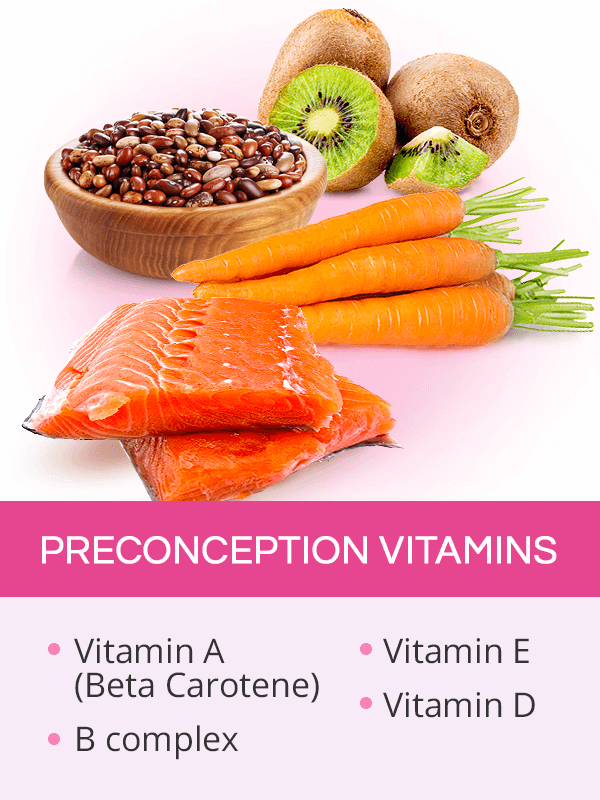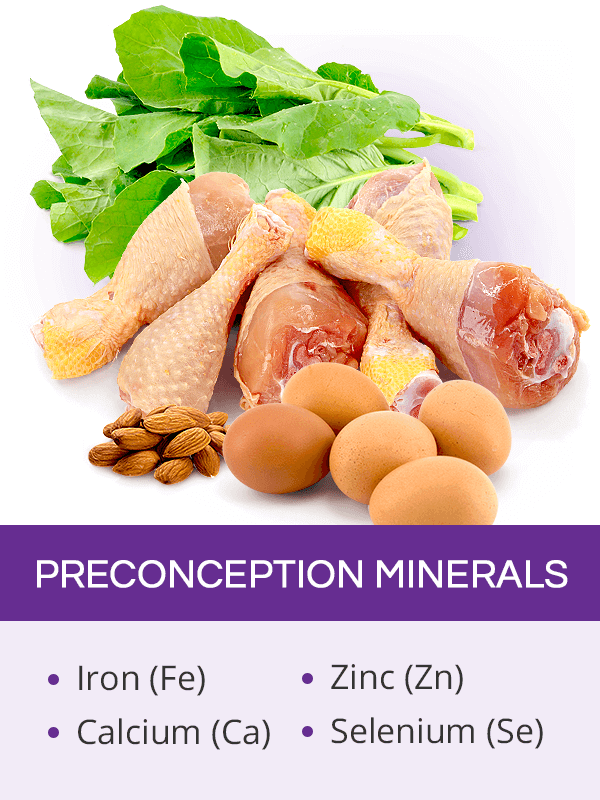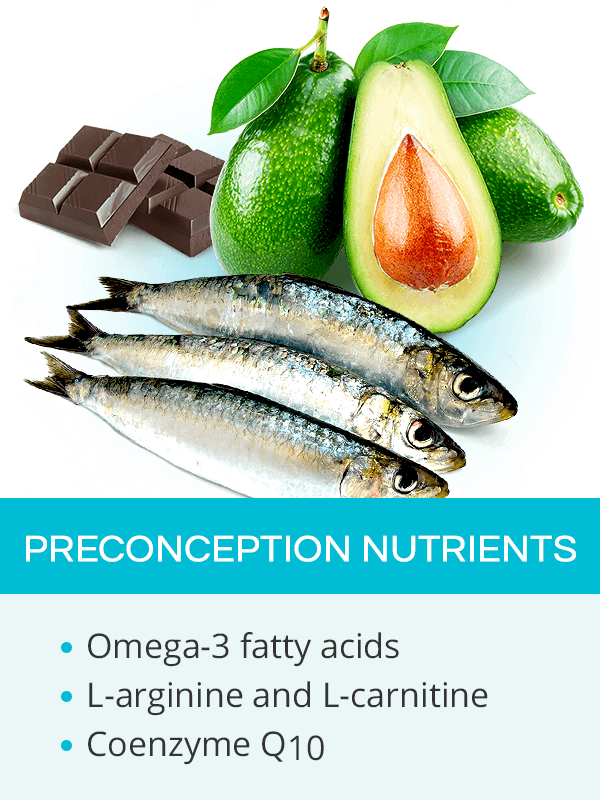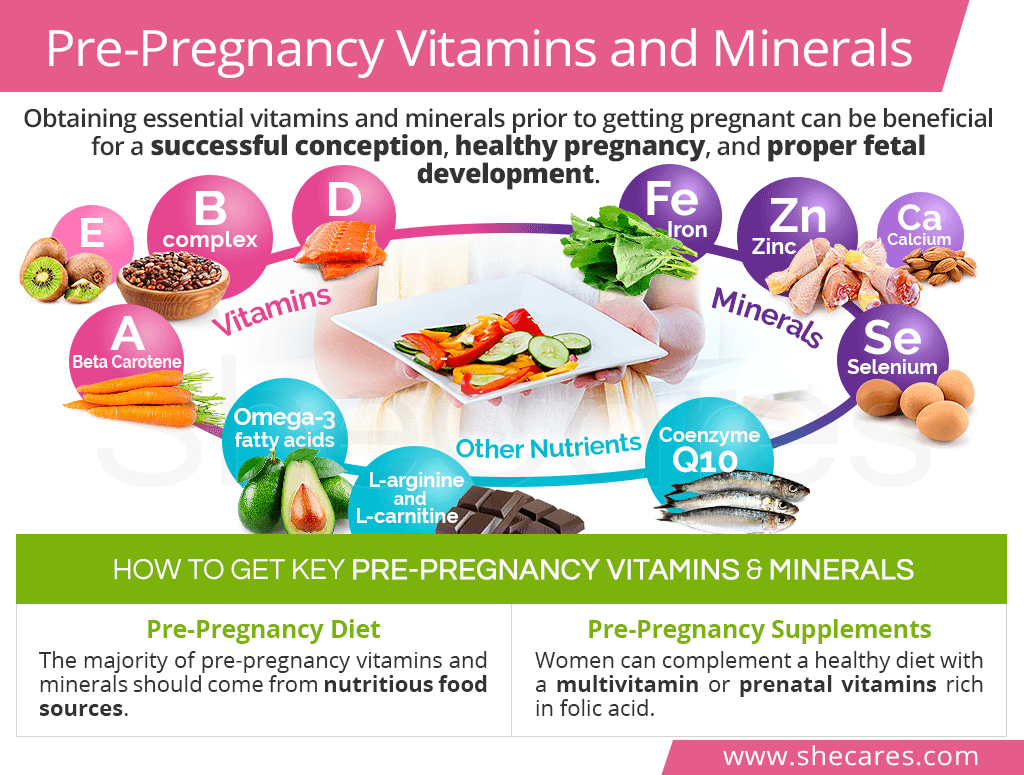Key Preconception Vitamins & Minerals
Although there are many more nutrients needed to sustain bodily functions, the following vitamins, minerals, and other nutrients have been found to play important roles in preconception nutrition:

Preconception Vitamins
- B vitamins are crucial before and during pregnancy, particularly B6, B9 (folate), and B12. They lower the risk of pregnancy complications and birth defects as well as help in the formation of the fetal brain, nervous system, and more.
- Found in: beans, lentils, sunflower seeds, avocado, barley, millet, cheese
- Vitamin D is required for ovarian eggs to properly mature as well as for adequate absorption of calcium. Although vitamin D can be obtained from natural sunlight, it can also be obtained from numerous food sources.
- Found in: salmon, ricotta cheese, eggs, squash, peaches, mushroom
- Beta carotene found in food is converted in the body into vitamin A. It has strong antioxidant properties, thanks to which helps it prevent DNA damage caused by free radicals.It also aids in tissue repair after childbirth.
- Found in: apples, carrots, sweet potatoes, pumpkin, spinach, broccoli, bell peppers
- Vitamin E is an antioxidant that have been shown to increase pregnancy rates in women using assisted reproductive technologies (ARTs). It also protects the cells from free radical damage and strengthens the immune system.
- Found in: kiwi, corn, walnuts, avocado, eggs, olive oil, olives, papaya, melon
- Vitamin C is needed before pregnancy to make collagen, which builds skin, bones, and cartilage. It has antioxidant properties helpful in boosting immunity and has been found to improve iron absorption in the body as well.
- Found in: lemon, broccoli, camu camu, cranberry, pineapple, tomatoes

Preconception Minerals
- Zinc assists in maintaining estrogen and progesterone balance and regular menstruation as well as the maturation of the eggs in the ovaries and their transport through the fallopian tubes.
- Found in: chicken, almonds, cashews, salmon, cocoa, pumpkin seeds, sesame seeds
- Iron is crucial in transporting oxygenated blood to reproductive organs to ensure proper egg maturation and prevent irregular periods or ovulation problems arising from its shortage.
- Found in: spinach, kale, apricots, bets, figs, beans, chickpeas, quinoa, oats
- Selenium has been found to have antioxidant properties that protect the body cells from free radicals, thus decreasing the risk of chromosomal abnormalities causing birth defects and miscarriages.
- Found in: mushroom, asparagus, broccoli, salmon, garlic, banana, mango
- Calcium requirements greatly increase during pregnancy as it is needed to build the baby's teeth, heart, bones, muscles, and nervous system. Proper calcium levels can also protect women from developing hypertension or preeclampsia during pregnancy.
- Found in: sesame seeds, chia seeds, almonds, tofu, herring, figs, bok choy, cheese
- Iodine is needed for proper thyroid hormone production. It also aids in the development of the baby's nervous system. Iodine deficiency has been associated with increased rates of infertility and miscarriages.
- Found in: sea salt, strawberries, broccoli, spinach, watercress, fennel, turkey

Other Preconception Nutrients
- Coenzyme Q10 assists in energy production and utilization within the egg cells. As such, it helps optimize their maturation and quality before they are released on the day of ovulation.
- Found in: fatty fish (herring, sardine, mackerel), oranges, strawberries, pistachios, peanuts
- L-arginine and L-carnitine are key to maintaining a healthy female reproductive system by stimulating blood flow to the uterus and other organs. These amino acids can worsen the symptoms of some sexually transmitted diseases (SDTs), like herpes.
- Found in: dark chocolate, wild-caught fish, brazil nuts, coconut, pumpkin seeds, sunflower seeds
- Omega-3 fatty acids improve a woman's fertility by reducing inflammation in the body and increasing blood flow to reproductive organs. It has also shown to reduce the risk of premature birth and increase success rates of in vitro fertilization (IVF).
- Found in: avocado, salmon, sardines, mackerel, walnuts, soybeans, chia seeds, flaxseeds
- Choline is an important nutrient in fetal development, particularly the baby's brain, which affects his or her future cognitive abilities. Also, low choline levels in pregnancy can increase the risk of neural tube defects.
- Found in: eggs, fish, dairy, spinach, beats, beans, wheat, cauliflower, peanuts
How to Ensure Proper Preconception Nutrition
The main objective of preconception nutrition is to resolve nutritional deficiencies and hormonal imbalance in order to improve overall health, boost fertility, and prepare the body for nurturing a human being.
Pre-Pregnancy Diet
As previously mentioned, the majority of essential nutrients needed to prepare a woman's body for getting pregnant should come from food.
A balanced and nutrient-rich preconception diet not only promotes hormonal balance to regulate menstrual cycles and ovulation, but also helps women achieve a safe weight in order to get pregnant without problems and go through pregnancy without complications.
Following a fertility diet is quite popular among aspiring mothers as it helps them obtain all preconception vitamins and minerals they need. It consists of a varied meal plan composed of healthy fats (avocado, olive oil, nuts), lean protein (preferably plant-based: beans, nuts, seeds), and complex carbohydrates (whole grains, fruits, vegetables).
Pre-Pregnancy Supplements
Supplementing with preconception vitamins and minerals should complement a healthy diet, not be used in its stead. Because not all supplements are safe to be continued throughout pregnancy, it is recommended to first consult a doctor.
Women who plan their pregnancy ahead of time often take advantage of various fertility vitamins and supplements to boost their chances of getting pregnant. Some, out of convenience, prefer to take a multivitamin three to six months prior to conceiving.
Although prenatal vitamins rich in folic acid are technically recommended to be taken as soon as a woman's pregnancy is confirmed, numerous studies have found that taking folic acid before pregnancy can decrease the risk of miscarriage and birth defects.
Key Takeaways
It is a natural impulse among women planning to get pregnant to do all they can to optimize their preconception nutrition so that they get pregnant more easily and ensure that their babies will have all nutrients necessary for their growth. However, with such an abundance of supplements and recommendations, trying to figure out which vitamins to take before pregnancy might be a bit confusing. Unless there are specific nutritional deficiencies or a hormonal imbalance that calls for more customized approaches, women are advised to obtain the majority of key pre-pregnancy vitamins and minerals, such as vitamin B complex, zinc, iron, or omega-3 fatty acids, from food. Then, complementing a balanced and nutritious diet with a multivitamin or prenatal vitamins rich in folic acid can prepare a woman for successful conception and a healthy pregnancy.
Sources
- American Journal of Obstetrics and Gynecology. (2018). Diet and fertility: a review. Retrieved December 14, 2018 from https://www.ncbi.nlm.nih.gov/pubmed/28844822/
- American Pregnancy Association. (2017). Nutrients & Vitamins for Pregnancy. Retrieved December 14, 2018 from http://americanpregnancy.org/pregnancy-health/nutrients-vitamins-pregnancy/
- American Pregnancy Association. (2018). Prenatal Vitamin Ingredients. Retrieved December 14, 2018 from http://americanpregnancy.org/pregnancy-health/prenatal-vitamin-ingredients/
- Frontiers in Public Health. (2018). The Influence of Diet on Fertility and the Implications for Public Health Nutrition in the United States. Retrieved December 14, 2018 from https://www.ncbi.nlm.nih.gov/pmc/articles/PMC6079277/
- Journal of Bone and Mineral Research. (2012). Vitamin D Supplementation during Pregnancy: Double Blind, Randomized Clinical Trial of Safety and Effectiveness. Retrieved December 14, 2018 from https://www.ncbi.nlm.nih.gov/pmc/articles/PMC3183324/
- Your Fertility. (2018). Nutrition and supplements. Retrieved December 14, 2018 from https://www.yourfertility.org.au/everyone/lifestyle/nutrition-and-micronutrients


